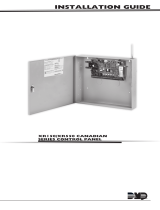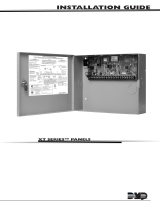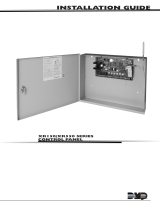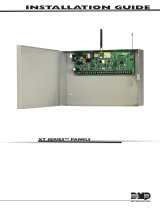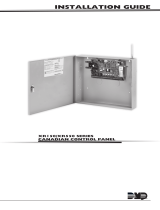
Designed, engineered, and
manufactured in Springfield, Missouri
INTRUSION • FIRE • ACCESS • NETWORKS
2500 North Partnership Boulevard
Springfield, Missouri 65803-8877
800-641-4282 | dmp.com
© 2021 Digital Monitoring Products, Inc.
LT-1626 21203
Specifications
Battery
Life Expectancy 1 year using 2 batteries
Type 3.0V lithium CR2450
See Battery Life Expectancy for more details.
Transmit condition Alarm, Low Battery
Dimensions 6"H x 2.6"W x .75"D
Color Black
Housing material Flame retardant ABS
Patents
U.S. Patent No. 7,239,236
Compatibility
• 1100D Wireless Receivers
• 1100DH Wireless High Power Receivers
• 1100DI Wireless In-line Receivers
• 1100X Wireless Receivers
• 1100XH Wireless High Power Receivers
• XTLN Panels with an integrated wireless receiver
• XT50 Series Panels with an integrated wireless receiver
• XTLplus Series Panels
Certifications
FCC Part 15 Registration ID CCKPC0103
1139 WIRELESS BILL TRAP
TRANSMITTER
FCC INFORMATION
This device complies with Part 15 of the FCC Rules. Operation is subject to the following two conditions:
1. This device may not cause harmful interference, and
2. This device must accept any interference received, including interference that may cause undesired operation.
The antenna used for this transmitter must be installed to provide a separation distance of at least 20 cm (7.874 in.) from all persons. It
must not be co-located or operated in conjunction with any other antenna or transmitter.
Changes or modifications made by the user and not expressly approved by the party responsible for compliance could void the user’s
authority to operate the equipment.
Note: This equipment has been tested and found to comply with the limits for a Class B digital device, pursuant to part 15 of the
FCC Rules. These limits are designed to provide reasonable protection against harmful interference in a residential installation.
This equipment generates, uses and can radiate radio frequency energy and, if not installed and used in accordance with the
instructions, may cause harmful interference to radio communications. However, there is no guarantee that interference will not
occur in a particular installation. If this equipment does cause harmful interference to radio or television reception, which can be
determined by turning the equipment o and on, the user is encouraged to try to correct the interference by one or more of the
following measures:
• Reorient or relocate the receiving antenna.
• Increase the separation between the equipment and receiver.
• Connect the equipment into an outlet on a circuit dierent from that to which the receiver is connected.
• Consult the dealer or an experienced radio/TV technician for help.











